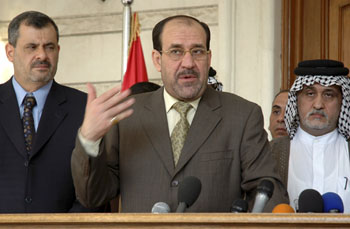Top News
Iraq urges calm ahead of Saddam verdict
(AP)
Updated: 2006-11-05 08:55
 |
Large Medium Small |
BAGHDAD, Iraq - Iraq's prime minister on Saturday urged his countrymen to accept the verdict against Saddam Hussein without violence, then in the next breath declared that the former dictator must get "what he deserves" with the decision that could send him to the gallows.
Nouri al-Maliki?- the highly partisan Shiite Muslim prime minister who was forced into years of exile during Saddam's Sunni-dominated rule?- imposed an open-ended curfew on Baghdad and two nearby provinces, and closed the international airport until further notice.
Checkpoints went up across Baghdad, and many cities and towns to the north were sealed by Saturday morning to keep residents in and potential attackers out.
The onerous measures threatened gunmen or anyone who ventured out with being shot on sight. Residents scrambled to stock up on food to wait it out indoors, and streets emptied by nightfall.
Iraq's High Tribunal hands down verdicts and sentences Sunday for Saddam and seven co-defendants — judicial findings that stood the chance of tipping the country into a full-blown sectarian civil war after a trial that stretched over nine months in 39 sessions and ended nearly 3 1/2 months ago.
It was hoped that Saddam's trial would heal the deep wounds among Iraqis as they watched their former tormentor stand before his accusers and suffer the consequences of nearly a quarter-century of brutal rule, during which tens of thousands of Shiites and ethnic Kurds were killed.
In the meantime, however, the center of the country flamed with sectarian killings that pitted Saddam's now disaffected Sunni backers against the newly empowered Shiites and their revenge-seeking militiamen and death squads.
Al-Maliki, who has been in office since May, has essentially looked the other way, paying lip-service to his role as leader of a nominal "unity government." His Islamic Dawa party claimed responsibility for a 1982 assassination attempt on Saddam that allegedly prompted a wave of revenge killings in the city of Dujail.
The verdicts to be handed down Sunday will decide the guilt or innocence of the eight men on charges of crimes against humanity for the Dujail crackdown in which the accused allegedly arrested hundreds of people, including women and children, tortured some to death and killed 148 in all.
Ali al-Haidari, a witness in the Dujail case who still lives there, said the Tigris River city of 84,000 was quiet on the eve of the verdict. The market town is about 50 miles north of Baghdad.
Al-Haidari said Shiite tribesmen and police had mobilized on the roads and fields nearby in preparation for revenge attacks from Sunnis, whose communities surround the city.
"We are preparing to celebrate tomorrow if he is sentenced to death," said al-Haidari, who lost seven members of his family to Saddam's alleged collective punishment of the city.
"Today we will remain awake waiting hour after hour for the verdict" he said. "We hope he will be executed here, where he committed his crime."
In a televised message, al-Maliki said Iraqis should celebrate a guilty verdict but calmly and in a way that "does not risk their lives."
"We hope that the verdict will give this man what he deserves for the crimes he committed against the Iraqi people," said al-Maliki, who last month said Saddam should be condemned to hang.
Many Sunnis, along with some majority Shiites and Kurds, fear a firestorm of sectarian killing if Saddam is found guilty, as is widely expected. Saddam's stature has only grown among his Sunni supporters during the trial. In the unlikely event Saddam should escape the gallows, Shiite rage was widely expected on the other side of the sectarian divide.
In advance of the verdict, vacationing soldiers were recalled to duty in one of the heaviest security crackdowns in Baghdad since the bombing of an important shrine in the city of Samarra in February unleashed rampant sectarian violence.
New checkpoints popped up on major roads, including within the heavily fortified Green Zone that houses Iraqi government offices and the U.S. and British embassies.
A heavy police presence and larger than normal numbers of U.S. troops patrolled the streets.
"We received orders to tighten security measures and to use any available policemen to tighten the security," police Lt. Ali Abbas said. The U.S. military refused to discuss specific measures planned for Sunday.
Brig. Abdul-Karim Khalaf, the Interior Ministry spokesman, told The Associated Press violence would be met with a stern response.
"We warn anyone who intends to exploit this event that our response will be tough and severe," Khalaf said.
At least 39 people died violently or were found dead nationwide, with attackers' weapon of choice proving to be mortar fire. Four mortar rounds poured down near Iraq's most-revered Sunni shrine, the Grand Imam Abu Hanifa Mosque, in north Baghdad, killing at least five people.
Baghdad police reported finding 15 bodies dumped throughout the city in the 24 hours ending at 6 p.m. Saturday.
In contrast with Iraqi's predominantly gloomy news, kidnappers released a blind Iraqi athlete and paralympics coach after determining neither man was linked to the Sunni insurgency, sports officials said.



